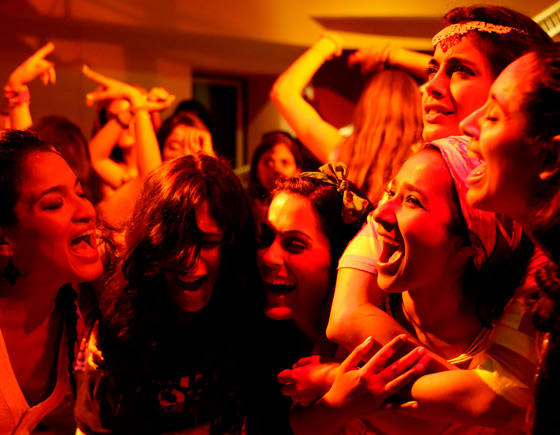In the opening montage of Angry Indian Goddesses, the new film from director Pan Nalin, we get quick glimpses into the lives of a series of women who are stifled, either in their careers, in their personal lives or in their simple desires to be recognized as people. These are recognizable problems that will feel familiar to marginalized people across the world, but the issues confronted are particularly relevant to present-day Indian women. In the first minutes of the film, an actress grapples with being a Bollywood film's stereotypical damsel in distress, a photographer chafes while shooting for a "fairness cream" ad and other characters deal with being suppressed and objectified by the men around them.
Angry Indian Goddesses takes place in a country that's grappling with sexual violence, especially the public and greater institution's reactions to it, and yet there's a more complete sense of these women's lives than just the negative aspects; the films finds these women going through a loosely structured journey of self-discovery, partying and laughing and sharing throughout. A pervasive awareness of male violence strives to manage and cohere these opposing tones.
The women introduced in the montage are brought together by photographer Freida (Sarah-Jane Dias), who's about to marry and brings them all to her home to celebrate. Her friends include fellow artists like musician Madhurita (Anushka Manchanda), half-British actress Joanna (Amrit Maghera), successful businesswoman Suranjana (Sandhua Mridul), housewife Pamela (Pavleen Gujral) and activist Nargis (Tannishtha Chatterjee). Freida's maid, Lakshmi (Rajshri Deshpande), and Suranjana's young daughter round out this group, who are all going through difficult periods in their lives.
Reading through that list of names and roles, some of the conflicts become clear quickly, feeling a touch stale even when you agree with the sentiment. One can sense a "Cat's in the Cradle" moment coming as soon as we learn that Suranjana, a force in the boardroom, is also a mother.
Angry Indian Goddesses collects these moments, which don't necessarily form a single full plot but rather a collection of vignettes on their way to a conclusion. Some get process montages, like Madhurita writing a song, Freida going through photo negatives and Joanna preparing for an audition — the audience gets to know them better and sympathize with them as they practice their craft — that show how men intruding into their world makes these characters feel in society at large, miles away from the safety of this temporary retreat. That these moments have to circle back to self-consciously revelatory, familiar-feeling conversations is a bit deflating, though the individual scenes themselves endure.
If there's a sense of inevitability to the arcs of the characters, details of mise en scene and cinematography manage to go a long ways towards evoking what the film's after. Handheld cameras cover the action fluidly while composing good frames, and the lighting seems to be all-natural, a choice that keeps with the easy chemistry and light crosstalk among the ensemble. In a film with so many characters and so much story to run through, the editing keeps the action moving.
Angry Indian Goddesses might not have the impact of a true call to arms, but in the mix of dark and light, stock and original, there's enough to help frame some important thoughts, and to get the audience thinking, too.
(Mongrel Media)Angry Indian Goddesses takes place in a country that's grappling with sexual violence, especially the public and greater institution's reactions to it, and yet there's a more complete sense of these women's lives than just the negative aspects; the films finds these women going through a loosely structured journey of self-discovery, partying and laughing and sharing throughout. A pervasive awareness of male violence strives to manage and cohere these opposing tones.
The women introduced in the montage are brought together by photographer Freida (Sarah-Jane Dias), who's about to marry and brings them all to her home to celebrate. Her friends include fellow artists like musician Madhurita (Anushka Manchanda), half-British actress Joanna (Amrit Maghera), successful businesswoman Suranjana (Sandhua Mridul), housewife Pamela (Pavleen Gujral) and activist Nargis (Tannishtha Chatterjee). Freida's maid, Lakshmi (Rajshri Deshpande), and Suranjana's young daughter round out this group, who are all going through difficult periods in their lives.
Reading through that list of names and roles, some of the conflicts become clear quickly, feeling a touch stale even when you agree with the sentiment. One can sense a "Cat's in the Cradle" moment coming as soon as we learn that Suranjana, a force in the boardroom, is also a mother.
Angry Indian Goddesses collects these moments, which don't necessarily form a single full plot but rather a collection of vignettes on their way to a conclusion. Some get process montages, like Madhurita writing a song, Freida going through photo negatives and Joanna preparing for an audition — the audience gets to know them better and sympathize with them as they practice their craft — that show how men intruding into their world makes these characters feel in society at large, miles away from the safety of this temporary retreat. That these moments have to circle back to self-consciously revelatory, familiar-feeling conversations is a bit deflating, though the individual scenes themselves endure.
If there's a sense of inevitability to the arcs of the characters, details of mise en scene and cinematography manage to go a long ways towards evoking what the film's after. Handheld cameras cover the action fluidly while composing good frames, and the lighting seems to be all-natural, a choice that keeps with the easy chemistry and light crosstalk among the ensemble. In a film with so many characters and so much story to run through, the editing keeps the action moving.
Angry Indian Goddesses might not have the impact of a true call to arms, but in the mix of dark and light, stock and original, there's enough to help frame some important thoughts, and to get the audience thinking, too.
